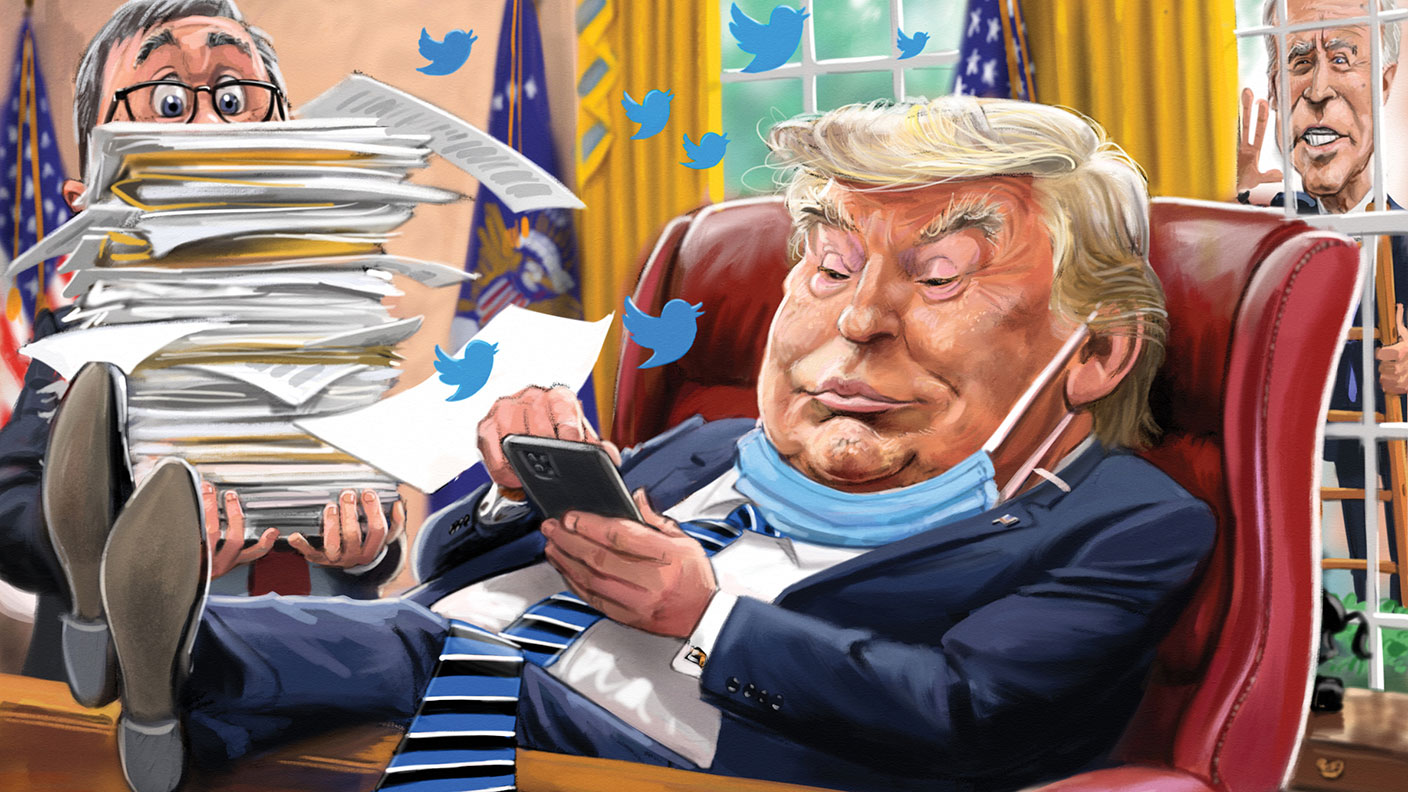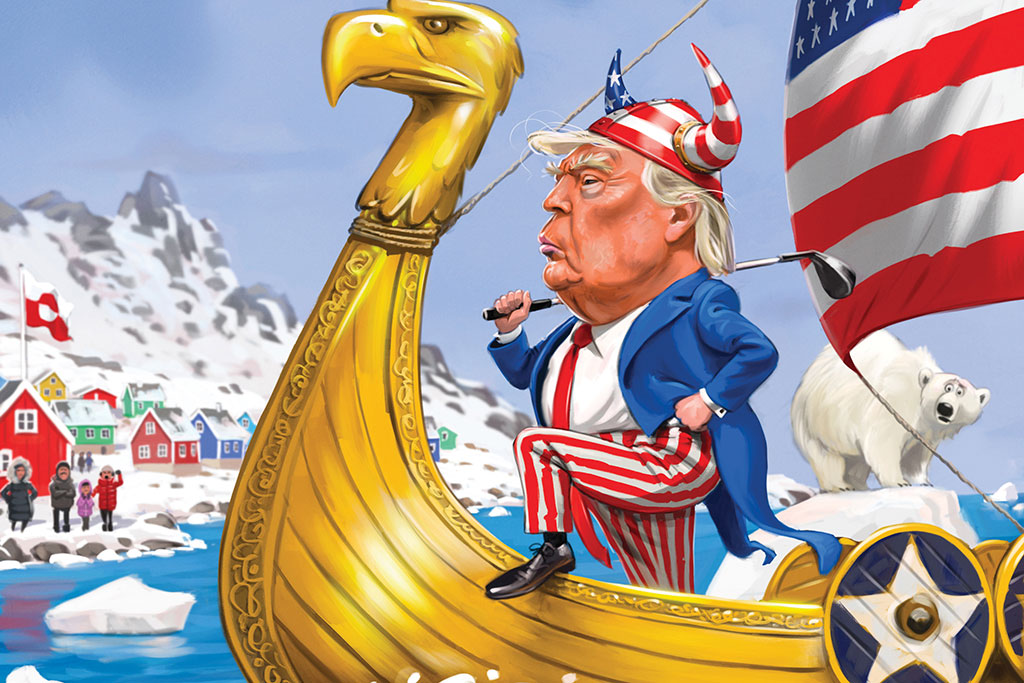The riskiest election in US history
Donald Trump’s illness has rattled markets as investors try to understand the implications of an incapacitated American president or a bitterly contested election.

Get the latest financial news, insights and expert analysis from our award-winning MoneyWeek team, to help you understand what really matters when it comes to your finances.
You are now subscribed
Your newsletter sign-up was successful
Want to add more newsletters?

Twice daily
MoneyWeek
Get the latest financial news, insights and expert analysis from our award-winning MoneyWeek team, to help you understand what really matters when it comes to your finances.

Four times a week
Look After My Bills
Sign up to our free money-saving newsletter, filled with the latest news and expert advice to help you find the best tips and deals for managing your bills. Start saving today!
US stock indices shrugged off news of Donald Trump’s hospitalisation over the weekend. The S&P 500 hit a one-month high as Trump was discharged on Monday. Yet the early optimism was undone when Trump ordered an end to talks with Democrats on a second stimulus bill. The S&P 500 finished Tuesday down by 1.4%.
The first stimulus bill lapsed over the summer, leaving unemployed Americans to depend on a patchwork of measures rolled out by the White House and individual states. The Democrat-controlled House of Representatives had initially called for $3.4trn in new support measures before reducing its demand to $2.2trn last week, while the Republican-controlled Senate favoured a figure closer to $1.6trn.
Would equities prefer Biden?
Trump’s surprise announcement that he would ask Republican allies to stop negotiating a stimulus will please fiscal conservatives wary of ever more federal spending, says the BBC’s Anthony Zurcher. Yet it is difficult to see how this benefits Trump politically. A new wave of economic angst before the election will do the incumbent no favours.
MoneyWeek
Subscribe to MoneyWeek today and get your first six magazine issues absolutely FREE

Sign up to Money Morning
Don't miss the latest investment and personal finances news, market analysis, plus money-saving tips with our free twice-daily newsletter
Don't miss the latest investment and personal finances news, market analysis, plus money-saving tips with our free twice-daily newsletter
The odds of a Joe Biden victory leapt over the weekend in betting markets, says Irwin Stelzer in The Sunday Times. That could be good for stocks, which “abhor uncertainty” when Trump is “uncertainty incarnate”. JPMorgan and Citigroup argue that a Biden presidency will be bullish for shares. They say it could deliver an economic “sugar high” from stimuli, especially if Democrats also take the Senate, as is looking increasingly likely.
In reality, investors are broadly agnostic about who prevails in November, Scott Knapp of CUNA Mutual Group tells the Associated Press. “It’s pretty difficult to overstate how understated the market’s reaction was,” to the president’s Covid-19 diagnosis. Investors don’t care for Donald Trump’s trade wars, but they seem just as unexcited about Joe Biden’s tax and regulate agenda. What does scare them is the prospect of a disputed election.
The president is unwell
Most presidential health scares make little impact on markets, but there have been exceptions, says Lex in the Financial Times. Eisenhower’s heart attack in 1955 saw the S&P 500 fall by nearly 7%, while it dropped by 3% following JFK’s assassination in 1963. Yet three months later – and this applies to nine out of ten pre-Trump health incidents – the market was either up or down by less than 1%. (The exception was Truman’s 1952 hospitalisation.) That is a testament to the strength of America’s institutions, which do not depend upon the health of one man.
Trump’s illness may have a larger impact than usual as it could shape US pandemic policy, says Jeremy Warner in The Daily Telegraph. Yet all this fretting about the election and American democracy seems overdone. Investors may complain about Washington, but they still buy the dollar and that says a lot more than words alone.
Get the latest financial news, insights and expert analysis from our award-winning MoneyWeek team, to help you understand what really matters when it comes to your finances.
-
 MoneyWeek Talks: The funds to choose in 2026
MoneyWeek Talks: The funds to choose in 2026Podcast Fidelity's Tom Stevenson reveals his top three funds for 2026 for your ISA or self-invested personal pension
-
 Three companies with deep economic moats to buy now
Three companies with deep economic moats to buy nowOpinion An economic moat can underpin a company's future returns. Here, Imran Sattar, portfolio manager at Edinburgh Investment Trust, selects three stocks to buy now
-
 Rachel Reeves is rediscovering the Laffer curve
Rachel Reeves is rediscovering the Laffer curveOpinion If you keep raising taxes, at some point, you start to bring in less revenue. Rachel Reeves has shown the way, says Matthew Lynn
-
 The enshittification of the internet and what it means for us
The enshittification of the internet and what it means for usWhy do transformative digital technologies start out as useful tools but then gradually get worse and worse? There is a reason for it – but is there a way out?
-
 What turns a stock market crash into a financial crisis?
What turns a stock market crash into a financial crisis?Opinion Professor Linda Yueh's popular book on major stock market crashes misses key lessons, says Max King
-
 ISA reforms will destroy the last relic of the Thatcher era
ISA reforms will destroy the last relic of the Thatcher eraOpinion With the ISA under attack, the Labour government has now started to destroy the last relic of the Thatcher era, returning the economy to the dysfunctional 1970s
-
 Why does Trump want Greenland?
Why does Trump want Greenland?The US wants to annex Greenland as it increasingly sees the world in terms of 19th-century Great Power politics and wants to secure crucial national interests
-
 Nobel laureate Philippe Aghion reveals the key to GDP growth
Nobel laureate Philippe Aghion reveals the key to GDP growthInterview According to Nobel laureate Philippe Aghion, competition is the key to innovation, productivity and growth – here's what this implies for Europe and Britain
-
 'Investors should brace for Trump’s great inflation'
'Investors should brace for Trump’s great inflation'Opinion Donald Trump's actions against Federal Reserve chair Jerome Powell will likely stoke rising prices. Investors should prepare for the worst, says Matthew Lynn
-
 The state of Iran’s collapsing economy – and why people are protesting
The state of Iran’s collapsing economy – and why people are protestingIran has long been mired in an economic crisis that is part of a wider systemic failure. Do the protests show a way out?